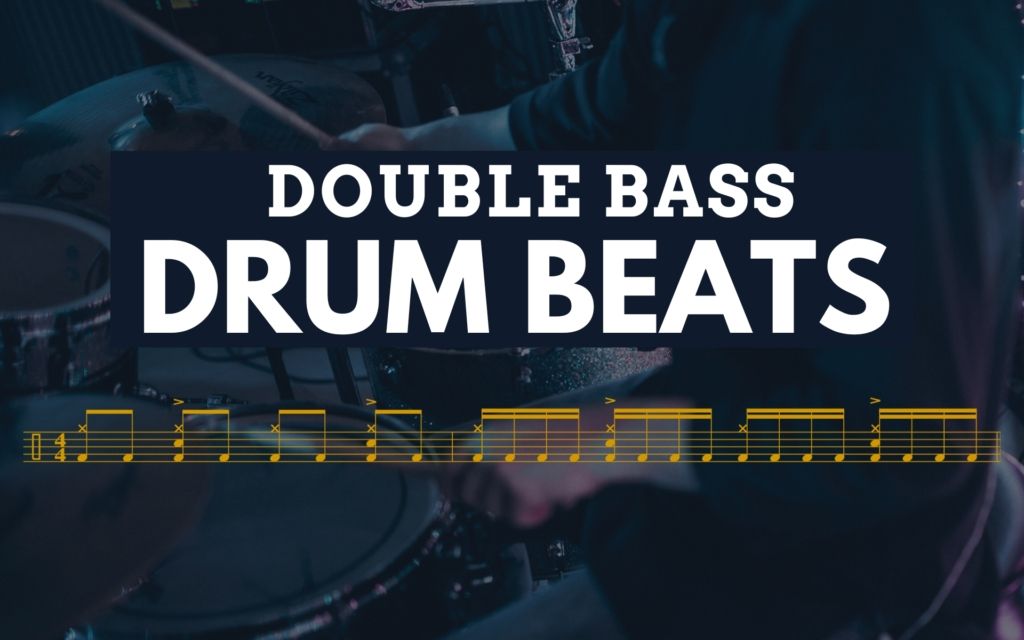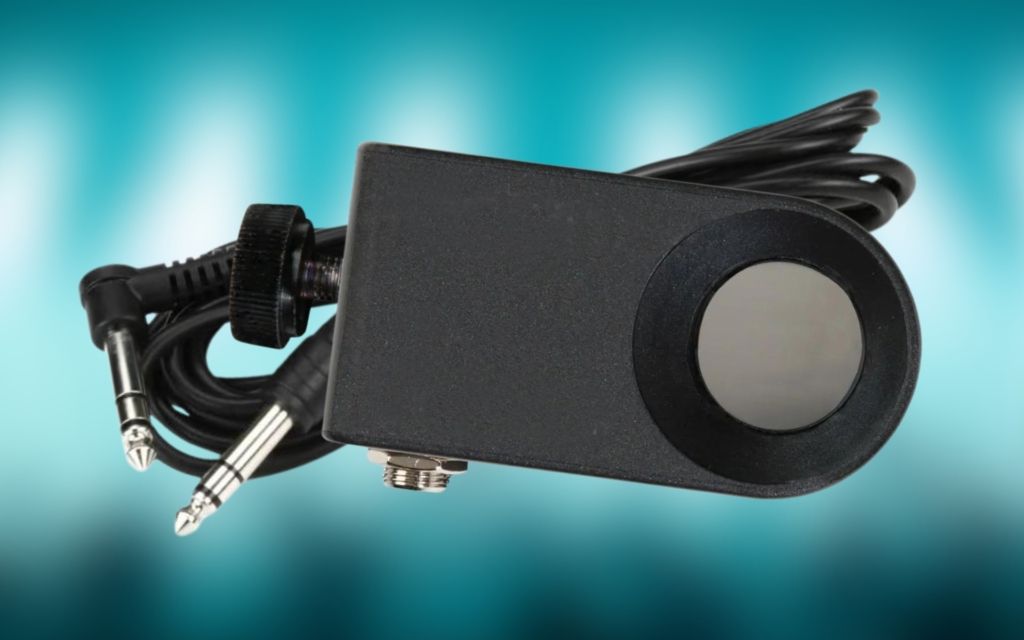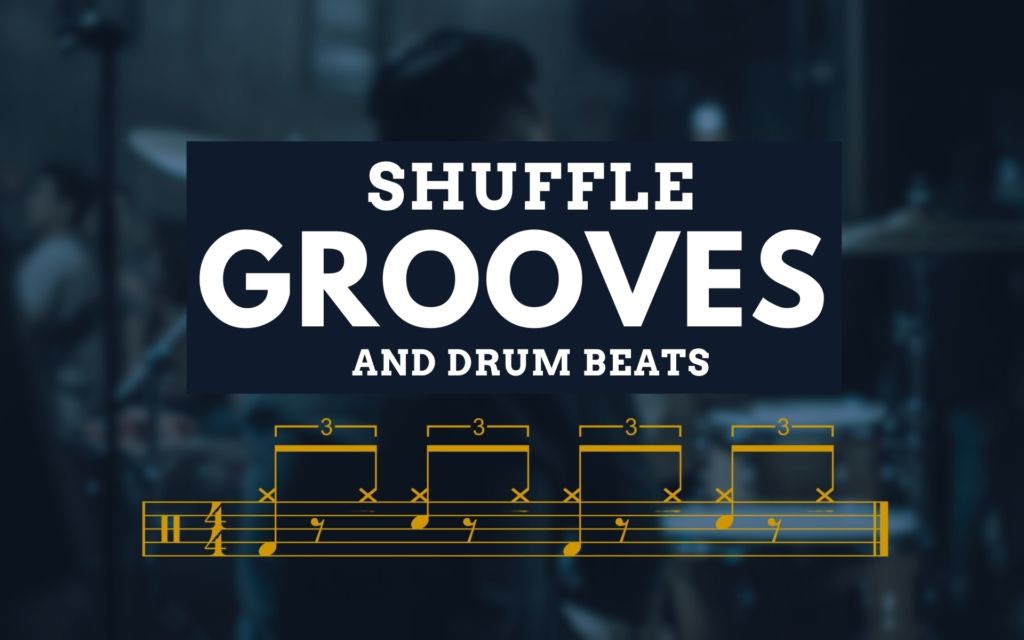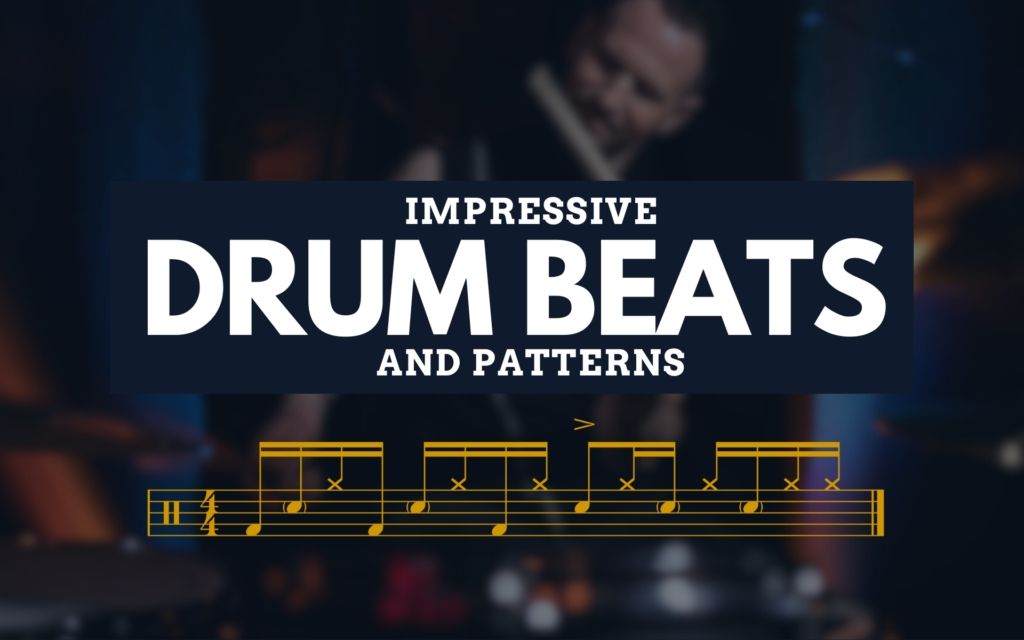Drums and guitar are two of the most popular instruments ever to be invented. In this guide, we explore which one you should choose to play.
Aspiring musicians are faced with tough decisions when trying to figure out which instrument they should learn. Ideally, we’d like to learn both drums and guitar, and while this may be possible further down the line, it’s usually best to focus our attention on one initially.
Aside from the more obvious differences between these two instruments, like the way they sound or their physical design, many other aspects should be taken into consideration before deciding which is best for you.
In this comprehensive guide, you’ll find an analysis of the key differences between guitars and drums, what you can expect if you decide to learn them, and a range of other helpful information on the topic.
Contents
Is Drums Guitar or Drums Easier to Learn?
Both drums and guitar have distinct learning curves, and both instruments are difficult to master to a high-level. But with both instruments, you can learn to play basic songs relatively quickly.
With drums, you can learn a simple 4/4 beat that involves using the kick drum, snare drum, and hi-hat, that you can use to play most classic rock and pop songs.
Guitar is also accessible to beginners. Once you learn the basic chords you can play a wide range of popular songs.
In my opinion, if you possess a strong sense of rhythm and timekeeping, I’d consider drums to be the more accessible instrument for reaching an intermediate level of playing proficiency.
However, mastering advanced performance techniques on both drums and guitar is no easy feat, and will take years of practice.
When it comes to drumming, concepts such as linear drumming, chops, playing polyrhythms, and soloing is difficult to master and will take a long time to build the necessary muscle memory and coordination.
Meanwhile, mastering guitar playing techniques such as string skipping and sweep picking on guitar, as well as building excellent finger strength and dexterity, takes years of practice.
Should I Start With Guitar or Drums?
Drums
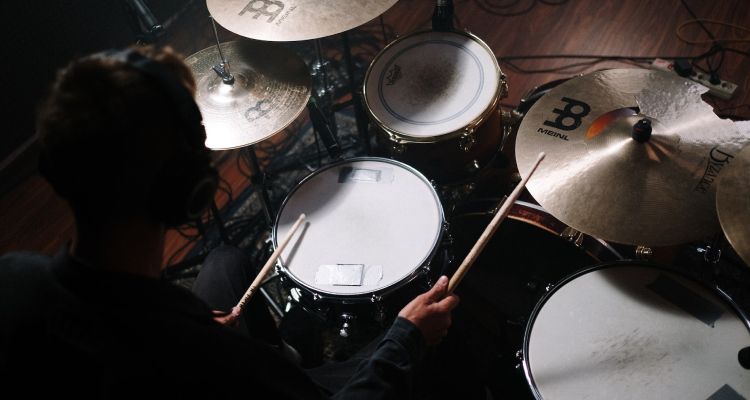
Technically speaking, drums are a broad category that includes any percussion instruments that are struck with some form of an object, like a stick or beater or the musician’s hand.
However, in this guide, we’re focusing mainly on playing a conventional drum set, which consists of the following:
- Kick drum
- Snare
- Toms
- Cymbals
Drums belong to the percussion family and, in some form or another, have been around for thousands of years. The drum kit that is used today, however, was first invented in 1918 when legendary manufacturer Ludwig unveiled the Jazz-Er-Up drum kit.
In the last 100 years, the drum set has been developed and refined, with an array of designs available to suit the specific styles and tastes of drummers.
Guitar

The guitar is one of the most popular instruments in the world and has been a staple of many musical styles since the sixteenth century. It has a long and interesting history, with the modern version of the instrument stemming from Spain in 1790.
The physical design of the guitar is simple yet effective. It consists of a body, usually made from wood, with strings stretched across a neck. Different types of guitars can have different numbers of strings, ranging from four to twelve. The most popular types of guitars are:
- Acoustic guitar
- Classical guitar
- Electric guitar
- Electro-acoustic guitar
With the invention of the electric guitar in the mid-1930s, popular music was changed forever. Suddenly, musicians could reach high volumes and produce many different tones, thanks to the possibility of amplification.
Dynamics & Tone
Volume
One of the most important things to consider when deciding whether to play the drums or guitar is their volume. Unless you have access to a space that is away from other people or fully soundproofed, playing the drums is likely to be a disturbance.
An acoustic drum set is one of the loudest instruments you can use. This makes them suitable for playing in a live setting or rehearsal space but, unfortunately, not so great at home.
The guitar is also capable of reaching very high volumes when you turn an amp up to full, but it’s also much easier to play quietly. An unplugged acoustic guitar or a nylon-stringed classical guitar is very unlikely to annoy your neighbors in the way that a drum kit would.
Furthermore, even when playing an electric guitar that is plugged in, you have the option to turn it down to a reasonable level to avoid any complaints.
One of the best ways for aspiring drummers who are concerned about making too much noise is to use an electric drum kit. These kits use digital samples of acoustic drums and allow you to play drums at much lower volumes without sacrificing tone or power, but they do lack the authenticity and feel of a real set.
Tone & Frequency Response
The sound of the drums and guitar can be vastly different, depending on the type of instrument and how it is played.
Drums have an incredibly wide frequency range, with each drum and cymbal able to be tuned for different frequencies.
The kick drum can produce a deep, powerful low-end, while the toms and snare drum also contribute significantly to the overall tone of a drum set, adding midrange and treble frequencies.
The cymbals are also an integral part of the overall tone, as their higher frequencies help to cut through and provide texture.
In comparison, guitars also have a wide frequency range, but it is generally narrower than drums.
The low end of a conventional electric or acoustic guitar is mostly handled by the E and A strings, while the remaining four strings provide more midrange and treble frequencies.
Melody vs. Rhythm
Guitars belong to the stringed instruments family, while drums are percussion instruments. It’s a common misconception that percussion instruments are not melodic, as instruments such as the piano, xylophone, or marimba all fall under that category.
Nevertheless, when comparing guitar and drums, it’s important to bear in mind that the former is predominantly a melody instrument, while the latter would be more accurately described as a rhythmic instrument.
This has an important effect on how you would go about learning either one. For example, if you are looking to learn the guitar, you will need to focus more on scales, chords, and melodies.
On the other hand, if you are looking to learn the drums, you will need to focus on elements such as developing a tight groove as well as timing and dynamics.
Some of these skills are obviously interchangeable, as playing guitar requires a great sense of rhythm in your strumming or picking hand. Likewise, a skilled drummer will have a good understanding of pitch, tone, and melody so that they can fit better into a performance or recording.
Is Drumming Harder Than Guitar?

Basic Playing Techniques
Although there’s an element of subjectivity involved, it’s important that you consider whether drums or guitar would be an easier instrument for you to learn if you want to make the most possible progress in the near future.
When it comes to playing techniques, the drums require more effort. Firstly, using four limbs simultaneously is likely to be very difficult initially, as it requires physical strength and coordination.
Additionally, a drummer must be precise when playing drums, as the drummer’s feel and timekeeping is what is responsible for the overall sound.
Crucially, Precise timing ensures that the music stays in sync, allowing other musicians to play their parts accurately.
Guitarists, on the other hand, don’t have to worry about four limbs working together at once and can focus more on ensuring they form the correct chord shapes with their fretting hand and strum in time with their other hand.
Timing & Rhythm
An important attribute that all musicians must develop is their timing, but this is particularly important for drummers. As a drummer, you must be able to maintain a steady tempo throughout an entire song, acting like a metronome for the other musicians.
Guitarists, on the other hand, can afford to be looser with their timing in many styles. As such, they are able to focus more on the expression of their playing and ensuring they choose the right note at the right time.
Indeed, there are some genres and styles, like metal or jazz, that require a guitarist to be incredibly tight in terms of their rhythm, but other styles, like blues or punk, afford more flexibility in this area.
Developing your timing as a drummer is likely to be a slow process, particularly if you’ve never learned another musical instrument before.
Dexterity
As we’ve discussed, playing a conventionally-assembled drum set requires you to use both hands and feet at the same time. The hands are used to play the hats, snare, toms, and cymbals, while your strongest foot is generally used for the kick, and your weaker foot controls the clutch mechanism on the hi-hat.
If you’ve ever driven a manual car before, you probably remember how alien it felt when your first tried to use your feet and hands together. This is a similar feeling to playing the drums for the first time.
The good news is that, like driving a car, eventually, dexterity and coordination will become second nature.
Playing guitar on the other hand, does not require you to use both hands and feet at the same time, but it still requires you to have a lot of level of dexterity in both hands.
You will need to move your fretting hand between different frets, either to play single notes or groups of notes together to form chords, as your other hand will need to strum or pick each string.
Learning the guitar requires more intricacy and attention to detail than drums, but it should take less time to achieve the basic level of dexterity required to play to a decent standard.
Is It Better to Learn Guitar or Drums?

We’ve covered most of the key areas of comparison between guitar and drums, but there are still some important aspects to discuss.
If you’re still wondering which of these instruments you should learn, the remaining section of this guide will help you to find the answers you need.
Are Drums More Expensive Than Guitars?
Cost is an important factor that we need to consider when choosing which of these instruments to learn. Being a musician requires us to invest in instruments and other equipment to maintain and keep our gear working at its fullest potential.
Generally, guitars are cheaper than drums. That said, both instruments require ongoing maintenance and care to ensure they stay in good condition, so the costs will add up over the years.
The reason that guitars are considered more affordable instruments to learn than drums is that there are more affordable entry-level models available.
Guitars don’t require a lot of materials, so manufacturers can keep the price of a very basic model around the $100 mark.
On the other hand, drum sets typically require more materials to make as they are made from a greater number of components, including drum shells, drum heads, cymbals, hardware, a throne, drumsticks, etc.
The average cost of a basic acoustic drum set can be anywhere from $350-$500
With intermediate and high-end drum sets, the shells and skins are included in a set, but then you will also need to purchase other components separately. Breakables, which include the stands, cymbals, and kick drum pedals, are all required to play the drums.
When considering which instrument to learn, it’s also important to think about the long-term costs associated with guitar and drums.
Drums require more ongoing maintenance than guitars, as the skins and heads will need to be replaced periodically. The estimated cost of replacing the skins on a drum set is anywhere from $100-$250, depending on the size of the drum set.
The cost of strings for a guitar will also need to be factored into the equation. You can pick up a cheap set for as little as $10, but they made need to be replaced every few months, so the cost adds up.
Drummers will also need to purchase sticks often as they are prone to break, but these can usually be bought in bulk for a reasonable price. If you play heavy styles of music, your sticks are likely to break more frequently, and this will add to the expense.
Practicality
As discussed earlier, a drum kit requires space and is loud, making it less practical for some living situations. Guitars are more portable and versatile, allowing for practice and performance in various settings.
Noise level is a big factor to consider. Drums are a lot louder than guitars, making them less practical for those who live in apartments or have noise restrictions.
Guitars, on the other hand, can be played with headphones or at lower volumes using an amplifier, making them more suitable for quieter environments.
An electronic drum kit is a more quiet alternative to learning to play on an acoustic kit however, and you can use headphones. But there is still a fair bit of noise from the clatter or rubber and mesh pads.
Also, guitars are more portable compared to drum kits, which can be large and require more space. Guitars can be easily carried around, which also makes them a lot easier to transport to gigs.
Opportunities
One of the best things about learning to play an instrument, whether it’s playing drums or guitar, is that it provides you with the opportunities to perform, record, and compose music.
The guitar is an instrument that can either be played solo or in an ensemble, but drums are more likely to be performed with other musicians. If you want to write songs, then learning to play guitar is definitely the better option.
There is often a shortage of drummers around, as the instrument is louder and, therefore, less practical to learn.
Consequently, if you reach a good level of skill as a drummer, then you’ll likely have many opportunities to work within the industry – but this, of course, requires networking and perseverance.
As a guitar player, you can perform acoustically and accompany your instrument with vocals. You can also record your own songs using one or two microphones, which is not possible when playing a drum kit.
Final Thoughts
Drums and guitars are two of the most popular and frequently used instruments across all musical styles. They’ve played vital roles in most iconic genres, from jazz to rock n’ roll and R&B.
Overall, both drums and guitars are excellent instruments to learn. Ultimately, the decision of which one to choose will depend on your personal preferences and circumstances.
If you are a beginner, then it could be worth exploring both drums and guitar to see which one you prefer, but if you’re concerned about the space a drum set takes up, then the guitar is the more practical option.


